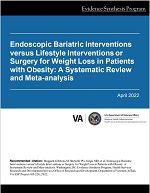
Recommended Citation:
Maggard-Gibbons M, Shekelle PG, Girgis MD, et al. Endoscopic Bariatric Interventions versus Lifestyle Interventions or Surgery for Weight Loss in Patients with Obesity: A Systematic Review and Meta-analysis. Washington, DC: Evidence Synthesis Program, Health Services Research and Development Service, Office of Research and Development, Department of Veterans Affairs. VA ESP Project #05-226; 2022.
Download PDF: Complete Report, Executive Summary, Report, Appendices
Endoscopic bariatric therapies (EBTs), such as endoscopic sleeve gastrectomy (ESG), intragastric balloon (IGB), and AspireAssist offer new potential treatments for obesity and associated comorbidities. These therapies offer significant weight loss, and some offer significant improvements in metabolic parameters that may be useful in treating patients with obesity.
Despite the increase in prevalence of obesity, less than 1% of patients who qualify ultimately undergo bariatric surgery. Pharmacotherapy has traditionally been the only option for clinical treatment of obesity for those who do not receive surgery. The development of endoscopic bariatric therapies such as ESG, IGB, and AspireAssist offer alternatives to pharmacotherapy and bariatric therapy. Given the recent introduction of these treatments, questions remain about how they are best utilized in the VA system.
We identified 37 publications describing IGB, ESG, and AspireAssist. Of these, 16 were RCTs, 15 were observational comparisons, and 6 were case series. IGB, ESG, and AspireAssist were found to achieve statistically significant weight loss compared to lifestyle therapy at 6 and 12 months. ESG was found to achieve significantly less weight loss than laparoscopic sleeve gastrectomy (LSG) at 6 and 12 months. AspireAssist was found to achieve significantly less weight loss than Roux-en-Y Gastric Bypass (RYGB) at 12 months. IGB and ESG were found to achieve significantly greater quality of life (QoL) increases in patients, and ESG was found to have no significant difference in QoL change versus LSG. These treatments found no difference in Hemoglobin A1c after IGB, LSG, and AspireAssist versus lifestyle treatment. Overall, all therapies reported higher complication rates versus lifestyle therapy, and ESG was found to have significantly lower complication rates than LSG.
Endoscopic Bariatric Interventions versus Lifestyle Interventions or Surgery for Weight Loss in Patients with Obesity: A Systematic Review and Meta-analysis (Management Brief)
Weitzner ZN, Phan J, Begashaw MM, et al. Endoscopic Therapies for Patients with Obesity: A Systematic Review and Meta-Analysis. Surgical Endoscopy. 2023;37. DOI: https://doi.org/10.1007/s00464-023-10390-6.